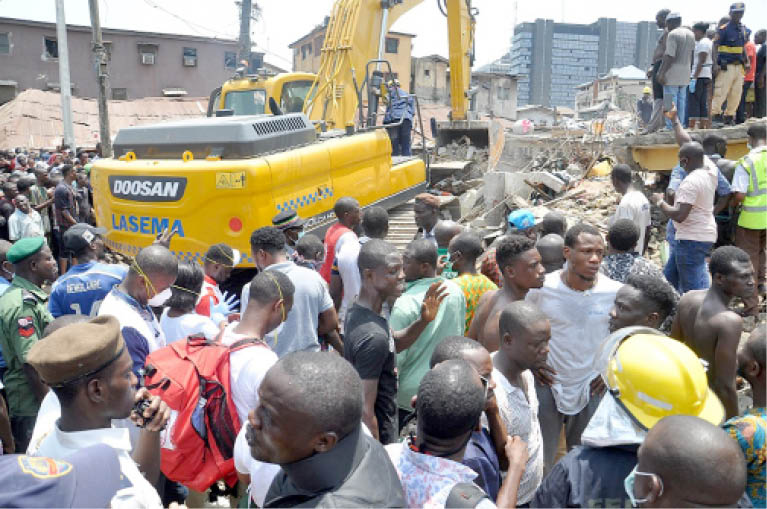Experts blame quacks, regulators for rise in building collapse
Professionals in the construction and housing sector have condemned the tragic collapse of a primary school building located on the second floor of a three-storey building in the Itafaji area of Lagos Island. The president, Housing Development Advocacy Network, Festus Adebayo, who is also the coordinator of Abuja International Housing Show, in an interview, at […]

Tractor working at the scene of the collapsed building.
Professionals in the construction and housing sector have condemned the tragic collapse of a primary school building located on the second floor of a three-storey building in the Itafaji area of Lagos Island.
The president, Housing Development Advocacy Network, Festus Adebayo, who is also the coordinator of Abuja International Housing Show, in an interview, at the weekend, with Housing News, said those in authority should be blamed for the incident which occurred as a result of negligence.
According to him, there was no verifiable upgrade of the collapsed building which is over 30 years old, adding that the Lagos State government failed in its statutory and primary duty as its coordinating body ought to have been providing oversight functions on all school facilities to ensure standards, safety and security of the pupils and students.
He therefore called on professional bodies and heads, regulators, development controllers, architects, Council for the Regulation of Engineering in Nigeria (COREN), and the Council of Registered Builders of Nigeria (CORBON) to unite against building collapse by working the talk and not just criticizing the unfortunate incident.
Adebayo further said it was worrisome that despite the high rate of building collapse in the country, the perpetrators had never been brought to book or sanctioned.
“What exactly are our law enforcement agencies in the development control doing, when is the government of this country going to have the political will to punish people found wanting in matters like this
“How can a school be situated on the third floor of a building, in a residential area, who approved that? Is government aware of this or are they just hearing this for the first time? What is the status of this building, how many buildings in that area are not in good shape?
“Asking to know who the developers, engineers in charge of the building are is a waste of time; this is not a building that was constructed three or five years ago. I am sure the person who handled or supervised the building may not even remember he built the building,” he said.
It’s time to enforce building code – Architect
An Architect, Mr. Amos Alao called for the enforcement of the Nigerian Building Code to avert the recurring building collapse in the country.
Alao, who is also the National Secretary, Society of Landscape Architects of Nigeria (SLAN), made the call in an interview with the News Agency of Nigeria (NAN) on Friday in Lagos.
The landscape expert said it was necessary to go back to the drawing board in order to avert recurring building collapse in the country by enforcing the national building code.
He said: “There have been so many perspectives to building collapse in Nigeria. Some have talked about the structural analysis, architecture or engineering failure, but little is said about the land on which the buildings are standing on.
“We are yet to implement the Nigerian Building Code which covers that if you are going to build a high rise building, it is supposed to have a certain percentage of soil volume or capacity to hold it.
“A lot of things are wrong with the Nigerian construction industry, everybody has this fault, from the manufacturers, to the clients, the engineers and the marketers.
“There is a Nigerian building code that needs to be implemented to overhaul the Nigerian construction industry; we need to start from the implementation and enforcement of the building code.
“The code contains what a building requires, for example escape routes, exit routes, all these parameters are stated in the building code.”
Why building collapse persists – NSE
Also speaking on the matter, the Chairman of the Ibadan branch of the Nigerian Society of Engineers (NSE) Adedamola Falade-Fatila, hinged the rising cases of building collapse on quackery and compromise in standards.
Falade-Fatila, who spoke with the News Agency of Nigeria (NAN) in Ibadan on Saturday, was reacting to the collapse of a building in Ibadan barely 72 hours after a similar incident in Lagos.
He said: “If every client, builder or developer consults a registered engineer to design their structures, we won’t find ourselves in this situation.
“This is purely the result of quackery and compromises in materials, skilled labour and so on.
“It is as they say in computer, garbage in, garbage out, what you put in is what you get.
“If you put in expertise, quality and professionalism, you will get a solid structure that will stand out and stand the test of time.
“The one that collapsed in Ibadan is still under construction and it gave way; that tells you that something is wrong somewhere.”
He said the association had been engaged in sensitization programmes to encourage the use of engineers for projects.
“If you have a structure that is above two floors, get a registered structural engineer, and if it is not up to that, get a registered engineer to do your design for you.
“In doing that, the engineer will give you advice and supervise your project so that there would be no compromise by the time the structure is being put up.
“If you meet anyone who claims to be an engineer, ask for his proof; in the age we are now, it is easy to know a registered engineer.
“You can check on the internet; registered engineers have their names compiled by the Council for the Regulation of the Engineering in Nigeria (COREN),’’ he said.
